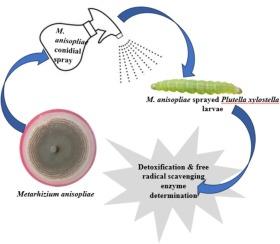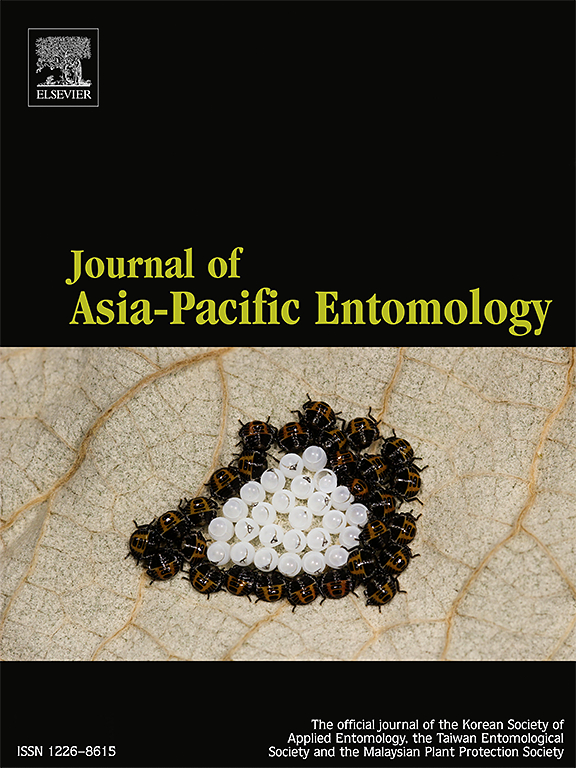调查鳞翅目褐飞虱 Plutella xylostella L. (Lepidoptera: Plutellidae) 对 Metarhizium anisopliae (Metschnikoff) Sorokin (Ascomycota: Hypocreales) 感染的酶反应:综合研究
IF 1.1
3区 农林科学
Q3 ENTOMOLOGY
引用次数: 0
摘要
由于菱纹夜蛾(DBM)对传统杀虫剂具有抗药性,它对十字花科作物构成了严重威胁。昆虫病原真菌(EPF),如Metarhizium anisopliae,为管理木蠹蛾提供了一种很有前景的解决方案。昆虫暴露于致死或亚致死剂量的微生物杀虫剂(尤其是 EPF)时,通常会产生各种免疫反应作为生存机制,包括激活解毒酶和保护酶。在这项研究中,从土壤中分离出的 M. anisopliae(Ma1)在分生孢子量为 1 x 109 个分生孢子/毫升时,可使 DBM 的死亡率达到 94.00 ± 0.245%,半致死浓度为 2.70 x 106 个分生孢子/毫升。在接种昆虫病原真菌后的不同时间间隔内,对木虱全身样本中各种解毒酶和自由基清除酶的活性进行了评估。结果表明,接种 48 小时后,酶的活性增加,在接种 96 小时后达到最大值。96 小时后,这些酶的活性开始明显下降。总之,研究发现 M. anisopliae 分离物 Ma1 对木虱非常有效。因此,可以使用适当的载体材料对其进行配制,并将其用作害虫综合治理计划的一个组成部分。解毒酶和自由基清除酶表达水平的提高有助于了解木虱对 M. anisopliae 感染的免疫机制。本文章由计算机程序翻译,如有差异,请以英文原文为准。

Investigating the enzymatic response of Plutella xylostella L. (Lepidoptera: Plutellidae) to Metarhizium anisopliae (Metschnikoff) Sorokin (Ascomycota: Hypocreales) Infection: A Comprehensive study
The diamondback moth (DBM), Plutella xylostella, poses a significant threat to cruciferous crops due to its resistance to conventional insecticides. Entomopathogenic fungi (EPF), such as Metarhizium anisopliae offer a promising solution for the management of P. xylostella. When exposed to lethal or sub-lethal doses of microbial insecticides especially EPF, insects often mount various immune responses as a survival mechanism, including the activation of detoxification and protective enzymes. In this study, M. anisopliae (Ma1) isolated from soil resulted in 94.00 ± 0.245 percent mortality of DBM at a conidial load of 1 x 109 conidia/ml, with an LC50 value of 2.70 x 106 conidia/ml. The activity of various detoxifying and free radical scavenging enzymes was assessed in whole-body samples of P. xylostella at varying time intervals after inoculation with the entomopathogenic fungi. The results showed that the activity of the enzymes increased after 48 h of inoculation, reaching a maximum at 96 h after inoculation. After 96 h, the activity of these enzymes started to decline significantly. In conclusion, the M. anisopliae isolate Ma1 was found to be highly effective against P. xylostella. Therefore, it could be formulated using appropriate carrier material and used as a component in Integrated pest management programs. Elevated levels of detoxification and free radical scavenging enzyme expression helps in understanding the immune mechanisms in P. xylostella in response to M. anisopliae infection.
求助全文
通过发布文献求助,成功后即可免费获取论文全文。
去求助
来源期刊

Journal of Asia-pacific Entomology
Agricultural and Biological Sciences-Insect Science
CiteScore
2.70
自引率
6.70%
发文量
152
审稿时长
69 days
期刊介绍:
The journal publishes original research papers, review articles and short communications in the basic and applied area concerning insects, mites or other arthropods and nematodes of economic importance in agriculture, forestry, industry, human and animal health, and natural resource and environment management, and is the official journal of the Korean Society of Applied Entomology and the Taiwan Entomological Society.
 求助内容:
求助内容: 应助结果提醒方式:
应助结果提醒方式:


